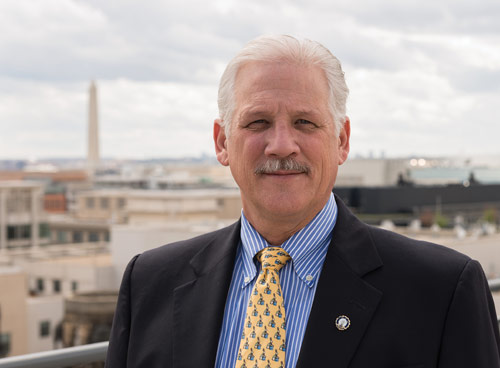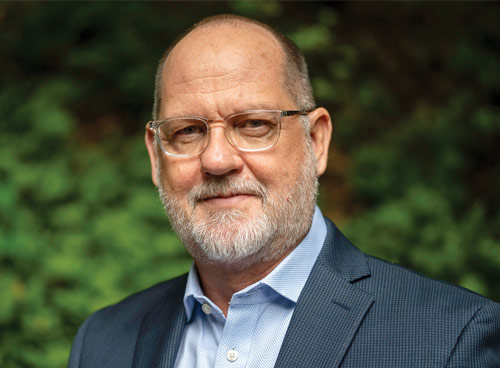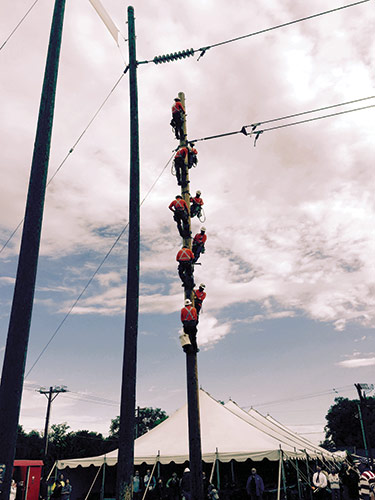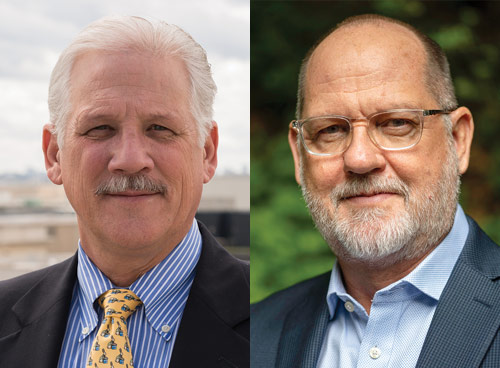IBEW Utility & Media Directors
Donnie Colston is the Utility Director, and Mark Brueggenjohann is the Media Director, for the International Brotherhood of Electrical Workers.



If you were wondering why the lineman braves the elements, and sometimes drives the truck across states to join the fight, read on. It'll be easy to see then that they are truly the passion of power.
PUF: What is your job and what do you do on a typical day?
Donnie Colston: My job is the director of utilities for IBEW and we represent just over ninety percent of the investor owned utilities, co-ops, and municipalities. We have about two hundred and forty thousand members we represent, and any normal day for us would be to review legislative and regulatory matters that may have an impact on the utilities and our members.
We process about sixteen hundred and fifty bargaining agreements throughout the U.S. and Canada. We also partner with a few utilities throughout the U.S. in apprenticeship training programs for our members, such as lineworkers, substation workers and power plant operators.
Our department consistently reaches out to non-participating utilities to discuss the value of a nationwide curriculum training program that would greatly enhance the skills and safe work practices of their workers, and our members. This type of training is a huge benefit to the utility and to customer satisfaction.
Another part of a normal day for us is evaluating regulatory and legislative matters, processing collective bargaining agreements, and providing technical information for our locals to learn from and put into practice while representing our members.
The locals may request information from all over the U.S. and Canada concerning, what's the line rate for a local authority lineman in Texas? What's a meter reader's rate in Maine? What's an underground splicer's rate in Canada? We research information and provide that to the locals for their review.
Mark Brueggenjohann: I'm the director of the media department. We have one of the larger media departments in organized labor. There are sixteen of us and that includes writers, video producers, videographers, photographers, and editors.
The media department has a museum curator who takes care of the IBEW museum and archives. We put out the monthly newspaper, The Electrical Worker, which has been in publication since January 1893.
We do a lot of video production. We have four people who are dedicated to solely doing video. We've got an in-house studio. It's essentially a small television station with production, post-production booths, audio booth, and a full-size studio.
We use the studio extensively, but most video is done in the field. Our video crews travel probably twenty-six weeks of the year. They're not doing it now, but they're on the road in all fifty states and Canada. They're telling the IBEW's story. Those videos are popular on Vimeo and YouTube and shared on our social media accounts.
PUF: Donnie, you previously were a journeyman lineman with Louisville Gas & Electric in Kentucky?
Donnie Colston: Yes. I was hired into Gas & Electric Company in 1980 into a transmission and distribution construction as a journeyman. I worked there thirty-three and a half years as a Construction and Maintenance Lineman for the utility.
I worked six hurricanes, and every type of storm you could think of that came through the Ohio Valley or to assist partnering utilities in service restoration. The utility would send us to assist in many states such as Ohio, Florida, Mississippi, and so on. It was a rewarding career.
My father was an electrician. My grandfather was an electrician. They were both IBEW. When I hired on at the utility, my father told me, you won't make a lot of money, but you'll always have a job. He was exactly right except for the salary. They pay the linemen very well, and they hold on to them as long as they can.
PUF: Mark, what is your background?
Mark Brueggenjohann: I've been an IBEW member since 1982. I went to work in St. Louis at a television station that was represented by IBEW local 4. The local represented engineers, the news photographers, and editors.
I moved to another station where IBEW represented just about everybody in the building, except for the on-air people. I worked almost nineteen years as an IBEW television employee. I was a photographer and editor most of that time.
I was heavily involved in my local as an executive board member and shop steward and was asked to fill the unexpired term of our business manager when he left the position. I served as business manager and financial secretary at my local in St. Louis for almost six years and then went to work as an international rep in the media department at the international office in 2007.
PUF: Why is the IBEW playing an important role in the industry for its members and the country?
Mark Brueggenjohann: It gives you stability and representation. For my industry in broadcasting, with the exception of the large markets and markets where there's union representation, it's a tough industry to work in. The pay is low for non-represented people and there's no stability.
PUF: Donnie, the IBEW has over two hundred thousand members. Who are they?
Donnie Colston: The IBEW is similar to a mini AFL-CIO. We represent railroad workers, manufacturing, media, utilities, outside construction, and every aspect of the utility industry. We have eleven districts and we have a vice president of each one of those districts. Except for the first district, which is all of Canada, each one has about five states that they are vice president over.
That involves every IBEW member in those four or five states that they're over. Then that vice president has international representatives that work for them, that service the local unions. Each IBEW local union has the ability to elect their own president business manager that runs the local. That's the person responsible for negotiating the collective bargaining agreement with the employer.
In the case of the utilities, that's the person that would handle negotiations, all grievances, and every aspect of the relationship, including wages and benefits between the company and the workers. There are about three hundred and sixty locals in the U.S. that are actual utility locals. But the IBEW is seven hundred and seventy-five thousand members.
Utility has only one portion of that, so we're only the second largest portion. Construction, which is all of our electricians and workers of that nature, is the largest portion of IBEW and the utility section is the second largest.
PUF: Mark, what kinds of stories do you try to look for and tell in the publication?
Mark Brueggenjohann: As far as utility is concerned, we work with that department and look for stories that would be of interest to our members and the public in general.
We do stories about political issues, like how the IBEW's urging Congress to move on nuclear waste storage. We do stories about how the skills need to change for energy workers. Donnie had to testify before a house subcommittee in March about those needs.
We do stories about deregulation. Stories about members involved in storm recovery working in utilities in particular are always well received. It's a wide spectrum of stories.
We look for stories that showcase the good things that the IBEW is capable of. We work on showing our members or future members that by becoming a part of the IBEW they're a part of an organization that's vital to keeping this country running.
PUF: Donnie, the IBEW often gets involved in policy issues or regulatory issues, and why is that important?
Donnie Colston: As the IBEW, we monitor all legislative and regulatory matters that would have an impact on our members and working conditions. Or could impact how the utility successfully operates.
We want the utility to be successful. We want them to be running. If the utilities are running and they're running well and making money, that means that our members are also doing well. It's to our interest to make sure that our partners in the utility industry have a fair set of rules to play by.
It may be the Department of Labor. It may be FERC, or NERC. It's to our advantage to play a role. We bring expertise to the table. It's our members that have the expertise on building, maintaining, and assuring that water, sewer, gas, and electric is generated, moved, and the customer can use it.
If there's a problem, it's our members that make the decisions on how we are going to solve that. The state and federal regulatory Commissions seek out that worker expertise that our members provide. We encourage each one of our local unions to get involved at their state Commissions to provide that expertise when something's being discussed.
PUF: What's most rewarding about what you do in your job?
Mark Brueggenjohann: There are two things. I like the idea that we're able to tell the story of the IBEW and promote it to the general public and our members, and make our members feel proud of being part of such an incredible organization.
The rich history of the IBEW is an amazing story, and to be able to share that is fantastic. Then we take that message and send it out to the general public with so many people who don't understand or know what organized labor is about, and we humanize it.
We show the real people, the real members, and what they're out there doing to improve lives; for themselves, their families and the public. From the standpoint of utilities, what we write about helps the public understand that if it wasn't for IBEW members, who are people just like them, we wouldn't have many of the conveniences we have and take for granted.
We're such an integral part of everything. Everything depends on electricity, and I like being able to tell that story.
Donnie Colston: The most rewarding part is when the locals are negotiating their collective bargaining agreement, to make sure that the local has all the information available. What are the safest work practices that utilities are doing, and how can we provide that information to them?
It's rewarding to have an IBEW member from a utility walk up and say, I'm proud to be an IBEW member. I'm proud to be part of that safety committee that determines our safe work practices. I'm proud that I have a blue-collar job and it provides benefits. I'm proud that I'm still working in providing power to the nation while the vast majority of the nation is not working.
It's rewarding to have the ability that the IBEW provides to all of our locals nationwide, to gather information together, to help them so they can negotiate fair wages and working conditions for members. That's the rewarding part for us, being able to service the local unions, and give them information they can use that will help our members on the front line.
International President Stephenson takes great pride in our relationship with our utility companies. What other industry would you find a CEO of a major employer participate in a commercial for the union who represents their employees?
Saluting the IBEW and Utility Workforce conversations:
- Jerry Bellah, VP for the IBEW Eighth District (Colorado, Idaho, Montana, Utah, Wyoming)
- Donnie Colston, IBEW Utility Director and Mark Brueggenjohann, Media Director
- Drew Stover, Business Manager for IBEW Local 84 (Atlanta)
- Virgil Melton, Curriculum Specialist at the Electrical Training Alliance
- Kris Anderson, Representative for the IBEW Third District (Delaware, New Jersey, New York, Pennsylvania)
- Rich Meisinger, Business Manager for IBEW Local 111 (Denver)
Category (Actual):
Department:
